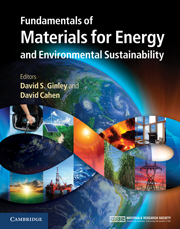Book contents
- Frontmatter
- Contents
- Contributors
- Preface
- Acknowledgments
- Part 1 Energy and the environment: the global landscape
- Part 2 Nonrenewable energy sources
- 9 Petroleum and natural gas
- 10 Advancing coal conversion technologies: materials challenges
- 11 Oil shale and tar sands
- 12 Unconventional energy sources: gas hydrates
- 13 Nuclear energy: current and future schemes
- 14 Nuclear non-proliferation
- 15 Nuclear-waste management and disposal
- 16 Material requirements for controlled nuclear fusion
- Part 3 Renewable energy sources
- Part 4 Transportation
- Part 5 Energy efficiency
- Part 6 Energy storage, high-penetration renewables, and grid stabilization
- Summary
- Appendix A Thermodynamics
- Appendix B Electrochemistry
- Appendix C Units
- Index
11 - Oil shale and tar sands
from Part 2 - Nonrenewable energy sources
Published online by Cambridge University Press: 05 June 2012
- Frontmatter
- Contents
- Contributors
- Preface
- Acknowledgments
- Part 1 Energy and the environment: the global landscape
- Part 2 Nonrenewable energy sources
- 9 Petroleum and natural gas
- 10 Advancing coal conversion technologies: materials challenges
- 11 Oil shale and tar sands
- 12 Unconventional energy sources: gas hydrates
- 13 Nuclear energy: current and future schemes
- 14 Nuclear non-proliferation
- 15 Nuclear-waste management and disposal
- 16 Material requirements for controlled nuclear fusion
- Part 3 Renewable energy sources
- Part 4 Transportation
- Part 5 Energy efficiency
- Part 6 Energy storage, high-penetration renewables, and grid stabilization
- Summary
- Appendix A Thermodynamics
- Appendix B Electrochemistry
- Appendix C Units
- Index
Summary
Focus
Tar sands and oil shale are “unconventional” oil resources. Unconventional oil resources are characterized by their solid, or near-solid, state under reservoir conditions, which requires new, and sometimes unproven, technology for their recovery. For tar sands the hydrocarbon is a highly viscous bitumen; for oil shale, it is a solid hydrocarbon called “kerogen.” Unconventional oil resources are found in greater quantities than conventional petroleum, and will play an increasingly important role in liquid fuel supply as conventional petroleum becomes harder to produce. With the commercial success of Canadian tar-sand production, and the proving of technology, these unconventional resources are increasingly becoming “conventional.” This chapter focuses on the trends that drive increased production from tar sands and oil shale, and discusses the geological, technical, environmental, and fiscal issues governing their development.
Synopsis
Oil shale and tar sands occur in dozens of countries around the world. With in-place resources totaling at least 4 trillion barrels (bbl), they exceed the world's remaining petroleum reserves, which are probably less than 2 trillion bbl. As petroleum becomes harder to produce, oil shale and tar sands are finding economic and thermodynamic parity with petroleum. Thermodynamic parity, e.g., similarity in the energy cost of producing energy, is a key indicator of economic competitiveness.
- Type
- Chapter
- Information
- Publisher: Cambridge University PressPrint publication year: 2011



